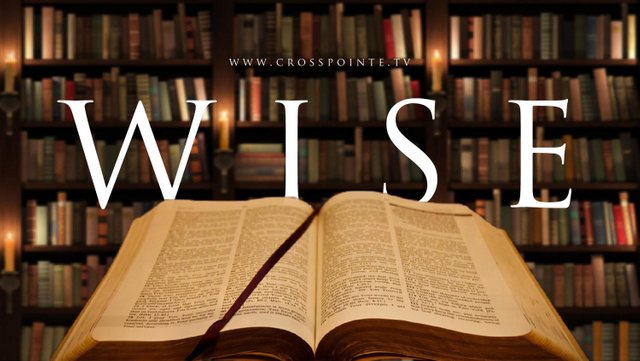WISE LIVING!
INTRODUCING THE LESSON
A wise choice would be to follow Christ. An unwise choice would be to get involved with drugs or alcohol.
The choices we make every day have a huge impact on our lives, both now and for eternity. In His Sermon on the Mount, Jesus gave us some valuable principles for making wise decisions. When we follow His commands, we’ll avoid the disaster that comes through bad choices and enjoy the benefits of living wisely.

DO NOT JUDGE OTHERS
(A) Don’t Condemn Others (Matthew 7:1,2,6)
QUESTION: Was Jesus saying in Matthew 7:1 that His followers aren’t supposed to criticise or even evaluate wrong actions or attitudes? Why or why not?
Jesus didn’t ‘condemn all evaluation or criticism. Elsewhere in Matthew, He told His disciples to make decisive judgements on actions, attitudes, and motives (Matthew 7:15-20,-10:11-15; 18:17,18).
Jesus warned against being hypocritical or selfrighteous toward others. “Judge” is used in the sense of criticising, finding fault, and condemning. It implies a quarreiiing, bickering attitude based on a person’s own opinions and scrupies rather than on the Word of God. When we arrogantly condemn others without mercy, God will judge us the same way we judge others. A condemning or unforgiving attitude never pleases the Lord.
(B) Use Proper Discernment (Matthew 7:3-5)
Jesus used a vivid illustration to make His point about judging others. A man with a beam in his eye offers to remove a mote from someone else’s eye. The beam symbolises a major shortcoming, while the mote represents a minor flaw. This absurd contrast helps us see how foolish it is to be hypocritical in this area. By the comparison of the mote and beam, Jesus implied that our own shortcomings are usually worse than those we are so disturbed about in others.
QUESTION: Why is it hypocritical to confront others about sins without first dealing with our own problems?
Throughout the Sermon on the Mount, Jesus called His people to examine their hearts. He wants us to be motivated by humility and love in all we do including when we need to confront others. This won’t happen if we’re unwilling to examine our own hearts. And we won’t demonstrate Christlike mercy if we are not focused on helping and restoring those who struggle.
QUESTION: Why is it so important to make appropriate judgements?
Evaluating the lives of others can be uncomfortable. After all, most people don’t like confrontation. Yet when we’re willing to identify a problem and deal with it, we can guard others and ourselves against spiritual disaster. When we act with genuine Christian love, we can help each other grow and stay strong in the faith.
CHOOSE WISELY
(A) Seek God’s Blesslngs (Matthew 7:7-12)
QUESTION: How can we know if we ’re making wise choices?
The wisdom of our choices can be seen in the results or consequences. Good choices are made with eternity in view, and they will benefit our lives and others. But bad choices will harm us and might even endanger others. Worst of all, such decisions can destroy us spiritually.
QUESTION: What hinders us from receiving God’s greatest blessings in our lives?
We often struggle to receive God’s blessings when we fail to see His deep desire to meet our spiritual and physical needs. Jesus reminded us of God’s great concern for His people. No good parent would withhold the necessities of life from a child. Neither will God deprive us of what we need to live for Him in this world. He is faithful and reliable, whether we need material provision or spiritual help.
QUESTION: How should God’s blessings in our lives affect the way we treat others?
Commonly called the “Golden Rules”, Matthew 7:12 instructs us to follow our Heavenly Father’s example of love and compassion. His decision to bless us wasn’t based on our merit. In the same way, we must choose to treat others well. And Jesus’ standard is high, literally “in the way we’d want to be treated.”
(B) Follow God’s Way (Matthew 7:13,14)
QUESTION: Why do you think God’s way Is compared to a “strait" and “narrow” way?
Jesus compared following God to entering a small gate and travelling a narrow path. This wasn’t an appealing option for a traveller. A small gate would be difficult to enter, particularly if carrying a large load. Nor was a narrow way very inviting, and many would take another path if possible.
QUESTION: Why do you think the path that rejects God is compared to a “broad” road?
A broad gate or road would have been much more attractive to travellers. It allowed plenty of room for crowds and baggage. Nothing restricted them from going where they wanted to go with ease. Such a route would be a popular choice.
Jesus’ analogy is powerful and true. These paths lead to two very different destinations. God’s narrow way, which demands faith in Christ and faithfulness to Him, leads to eternal life, while sin’s appealing path ends in eternal death and destruction. Choosing God’s way won’t be easy. But in the end, it will prove to be the wisest choice.
cheers! Omonosa
Hi there
We found your post valuable to the steemchurch community
Thanks for sharing
Resteemed
OSWhen we arrogantly condemn others without mercy, God will judge us the same way we judge others.
A condemning or unforgiving attitude never pleases the Lord.
Thanks for sharing
OS